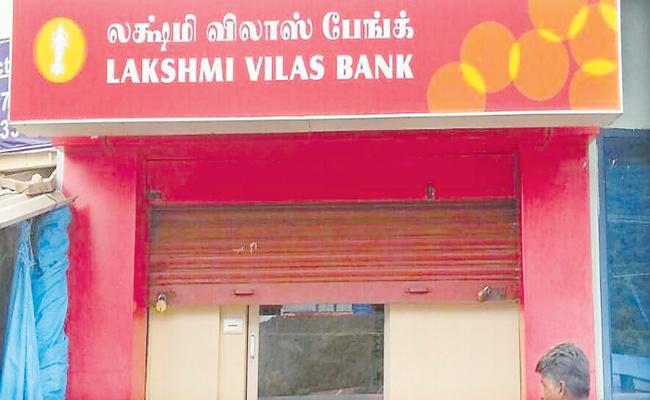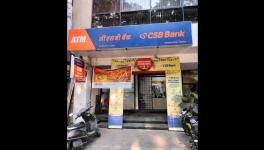What Brought Down Lakshmi Vilas Bank?

Chennai: Even as the Chennai-based Lakshmi Vilas Bank (LVB) has been placed under 30-day moratorium till December 16 by the Reserve Bank of India (RBI), its lending and recovery policies with regard to corporate loans are drawing attention. The moratorium announcement on November 18, and limit on cash withdrawals came as a rude shock to customers, though the crisis had been in the offing for long, say sources.
According to some of the 94-year-old bank’s shareholders, sanctioning of huge loans in three years and alleged collusion of the board of directors with the borrowers had led to the present crisis. The bank’s non- performing assets (NPAs) or bad loans have steadily increased since 2017.
Failed efforts by the bank through market mechanisms for survival and mergers has resulted in the announcement of moratorium.
A demand for merger of LVB with a public sector bank is being raised by shareholders and investors, who are opposed to its merger with Singapore’s DBS Bank.
Meanwhile, bank unions continue to demand criminal proceedings against wilful defaulters and total recovery of corporate bad loans.
‘SHIFT TO CORPORATE LOANS HURT BANK’
LVB continued as a traditional bank till 2017 after which it shifted focus to corporate loans from small and medium enterprise loans. The bank could disburse huge loans, but that has had a telling effect on its performance, leading to the current crisis.
Subramaniam, former general secretary of the LVB Officers Association, told NewsClick: “The present crisis is the result of collusion among some directors and borrowers. The board violated the lending regulations prescribed by RBI. The key decision-making bodies were contractualised and were utilised to violate norms and disburse huge loans. Those huge loans sanctioned in the past three years are now haunting the bank”.
The legal proceedings by the Economic Offences Wing against LVB and Singh brothers in the Religare Finvest Limited issue is an example of violation in lending norms. The major defaulters of the bank include Coffee Day group, Cox and Kings among others, said sources.
The bank’s total loan portfolio stands at Rs 16,000 crore, which is low considering 94 years of the bank’s existence. This is in contrast to Yes Bank, a new generation bank, which lent around Rs 1.5 lakh crore in just four years in only 16 years of its existence.
‘CHANGE LENDING AND RECOVERY POLICIES’
The corporate NPAs of LVB have been estimated between Rs 3,500 crore and Rs 4,000 crore. The Capital Adequacy Ratio was in negative terms in September 2020 after being reported at 0.17% in June 2020, while the BASEL-III norms recommend a 9% limit. The gross NPAs of the bank also increased to 25.4% in 2020.
The existing mechanism could be of very little help in recovering bad loans from the defaulters, bank unions said, adding that the policies of RBI and finance ministry in framing lending and recovery norms require a drastic change.
C P Krishnan, joint secretary of Bank Employees Federation of India (BEFI), said: “The government of India should contemplate making drastic changes in the lending and recovery policies. A 100% collateral security should be implemented for corporate loans as is being done for small borrowers”.
The failure in recovery of corporate NPAs has been admitted by the Finance Minister herself. “The Insolvency and Bankruptcy Code (IBC) has helped in recovering only 44% of corporate NPAs. Such policies will affect the banks and endanger the trust of citizens in the banking system. The government should ensure more stringent rules to recover corporate NPAs”, Krishnan added.
‘MERGE LVB WITH PSB AND COMPENSATE LOSS’
The proposed merger of LVB with DBS Bank India has not gone down well with the stakeholders. DBS Bank India is the subsidiary of Singapore-based DBS Bank, which again is the subsidiary of DBS Holdings. The bank has negligible presence in India, that too only in Metro cities.
“Past experiences have shown that rural branches are closed down when traditional banks are merged with private banks,” said Krishnan while pointing out that “60% of LVB branches are located in semi-urban and rural areas. So merging with a PSB is a better option instead of DBS Nank.”
Corruption allegations in private banks, such as ICICI Bank, Yes Bank, are also a key reason behind the demand for LVB’s merger with a PSB.
“The functioning of private banks is more opaque and prone to violation of norms. LVB should be merged with a PSB and its incurring loss should be compensated to the parent bank on merger, while proceeding with total recovery of corporate loans”, Krishnan added.
‘CUSTOMERS IN ANGUISH’
The announcement of moratorium sent shock waves among depositors, which was evident from the inflow of customers to branches for withdrawals. LVB’s shareholders, too, are staring at high losses, as its share prices have steadily declined with no or little buyers.
Though the RBI-appointed administrator assured payment to all depositors, there were reports of customer anger and anguish from many branches across Tamil Nadu.
The call for nationalisation of banks is also doig the rounds as deposits in private banks and non-banking finance corporations are guaranteed up to Rs 5 lakh, while deposits in PSBs have sovereign guarantee.
“The finance minister’s repeated announcement on having only four nationalised banks across the country is a dangerous move. Such a move, of either privatising the remaining or merging banks could affect the Indian economy to a large extent”, Krishnan said.
While the duration of moratorium is for one month, sources do not rule out an extension.
The employees of LVB are yet to receive any official communication on the prevailing issues, an employee said on condition of anonymity. “What is in newspapers is all we know. We have not received any information from the management so far”, he added.
Get the latest reports & analysis with people's perspective on Protests, movements & deep analytical videos, discussions of the current affairs in your Telegram app. Subscribe to NewsClick's Telegram channel & get Real-Time updates on stories, as they get published on our website.
























